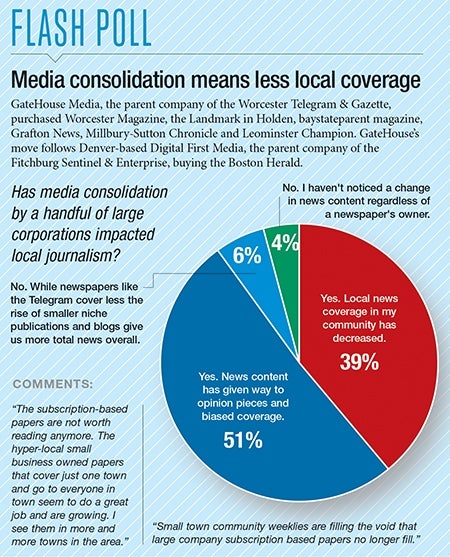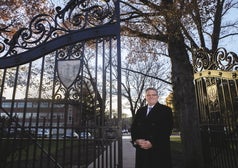The newspaper giant of Central Mass.
Chances are now very high daily community news coming out of Central Massachusetts will be from a publication owned by a large media corporation, with a strong commitment to the bottom line.
With the exception of the Gardner News, six of the seven daily newspapers in the region are owned by multi-publication companies from outside Massachusetts, and in late February the company owning the most and largest of those newspapers – New York-based GateHouse Media, which owns the Worcester Telegram & Gazette, MetroWest Daily News and Milford Daily News – bought out five weekly newspapers and one monthly magazine in the region.
GateHouse's $1.2-million purchase of Millbury-based Holden Landmark Corp. – which operates Worcester Magazine, the Holden Landmark, baystateparent magazine, the Grafton News, the Millbury-Sutton Chronicle and the Leominster Champion – puts more local news under the control of an organization in acquisition-and-cost-cutting mode since it emerged from bankruptcy four years ago.
“It's a good opportunity for us to really begin to look at how we're utilizing our precious resources and reporting in the field,” said Telegram Publisher Paul Provost.
Buy and cut
GateHouse's parent company, New Media Investment Group, operates 142 daily newspapers, 326 weekly newspapers and 569 locally focused websites.
In 2014, GateHouse filed for Chapter 11 bankruptcy, and out of that emerged New Media. The firm has since spent more than $900 million on acquisitions and increased its dividend 37 percent.
The company recorded a profit of at least $31.6 million in two of the last three years, and increased revenue from $1.2 billion in 2015 to $1.25 billion in 2016 to $1.34 billion in 2017.
Those increasing revenues and profits have come as New Media has cut costs, including by trimming personnel.
Last year, it cut operating costs not related to its acquisitions by $42 million, including a $22.5-million decrease in compensation. That trend was true for 2016, when it cut operating costs unrelated to acquisitions by $24.3 million, including a $10.2-million cut in compensation.
This cost cutting is a relatively common practice among large media companies. Virginia-based Gannett Co., which publishes USA Today and more than 100 daily newspaper throughout the county, had more than $3.1 billion in 2017 revenue and has reported severance costs of $152.8 million since 2015.
At the Telegram, the paper's staff is about 120 employees, down from its heyday of 800 in the mid-1980s, although that reduction has come as the media industry has adjusted to the long-term loss of advertising and subscription revenues revenues and under various corporate owners, including The New York Times Co., Florida-based Halifax Media Group and GateHouse.
Mark Henderson, a former digital editor at the Telegram, was laid off after the paper's acquisition by Halifax, which bought the paper in 2014 from Boston Red Sox Owner John Henry, only to sell its papers to New Media later that year for $280 million.
Chains like GateHouse and Denver-based Digital First Media – the owners of the Fitchburg Sentinel & Enterprise, Lowell Sun and the Boston Herald – have found their niche by driving margin from their properties and returning value to shareholders, Henderson said.
“Basically, [GateHouse] is at the top of their game in doing that,” he said.
GateHouse is executing its gameplan, but that may not be best for local community news, with Henderson saying, “I don't think there's enough investment going on on the content side."
A $1.2M alternative purchase
GateHouse's purchase of Holden Landmark gives the company control over another voice in the region: weekly community newspapers and – in the case of Worcester Magazine – a publication founded as the alternative to daily newspapers like the Telegram.
The Landmark purchase is unique, though, because its publications were already owned by a GateHouse executive. Kirk Davis, GateHouse Media's CEO and COO of New Media, owned the small cluster of papers as a side venture.
The acquisition “definitely strengthens [GateHouse's] position in Central Mass.,” Provost said.
After years of Telegram reporters competing against reporters of a company owned by Davis, all can collaborate under one proverbial roof, Provost said.
The goal, he said, is to preserve those publications, but to also improve upon them. How and if those papers will share editorial content has been yet been decided.
Worcester Magazine's distinct voice adds a different layer to GateHouse's publication portfolio, Davis said.
“The key to being successful is to be distinctive in what products you offer,” he said. “That's been a good formula for the Worcester Magazine, as it has been for community newspapers.”
Davis said all Landmark staff would be hired by GateHouse initially, “but how things evolve in months and years ahead will take its course based on how they're doing.”
The impact on local newsrooms
GateHouse isn't the only Central Mass. newspaper owner cutting operating costs. Denver-based Digital First Media closed the Fitchburg Sentinel & Enterprise office last month, opting to have staff work out of their homes.
“That's pretty amazing,” said Dan Kennedy, journalism professor at Northeastern University in Boston of having employees to work out of their homes.
Practicing journalists acknowledge certain papers would no longer exist if GateHouse or Digital First hadn't stepped in and righted the financial ships, Kennedy said.
“A lot of it depends on the individual circumstances of each paper, but in general, I think the idea of one corporate entity owned by a hedge fund operating hundreds of local newspapers is not especially good for journalism or society,” he said.
GateHouse journalists do the best they can with the limited resources, and it's the corporate ownership of these newspaper that is leading to criticism of a decline in local news and a decline in civic participation, said Desmond McCarthy, a journalism professor at Framingham State University and advisor to the student newspaper, which has sent college journalists to GateHouse papers for internships.
“The major problem is that a national corporation is creating a media monopoly and then engaging in cost-cutting practices that are detrimental to the quality of these news outlets,” McCarthy said.
These practices, McCarthy said, lead to poor pay and high turnover in GateHouse's newsrooms.
In the company's annual report, New Media referenced concern about retaining experienced employees, which is essential to the local journalism world where sourcing and developing relationships are crucial.
“A shortage of such employees, or our inability to retain such employees, could have an adverse impact on our productivity and costs, our ability to expand, develop and distribute new products and our entry into new markets,” the company said in the report. “The cost of retaining or hiring such employees could exceed our expectations, which could adversely affect our results of operations.”
Spencer Buell, a staff writer at Boston Magazine, had his first professional journalism job at the GateHouse weekly Arlington Advocate from 2013 to 2015, making $12.60 an hour working full time.
GateHouse's success with its bottom line can't be denied, but this business model, which is largely the same across the local journalism industry, is discouraging for young journalists, Buell said.
“I've seen a lot of people get frustrated and leave,” he said. “Many leave the industry for good.”
Still the local news source, at a profit
Despite changes in ownership and a smaller newsroom staff, the Telegram maintains a strong presence in the community and at city hall, said Mike Angelini, chairman of law firm Bowditch & Dewey, who once considered buying the Telegram as part of a local ownership group.
“I read it every day,” he said. “It's still a medium of choice for people interested in what's going on in Worcester.”
Low wages, layoffs and cuts at companies like GateHouse and Digital First, he said, are a product of the capitalistic society in which we live.
“It has to earn a profit. Otherwise, there wouldn't be anyone in this business,” Angelini said.
CORRECTION: A previous version of this story said the Worcester Telegram & Gazette had 800 employees in its newsroom during its heyday in the 1980s and about 130 today. Those numbers reflect the total number of employees at the publication, not just the newsroom.















0 Comments